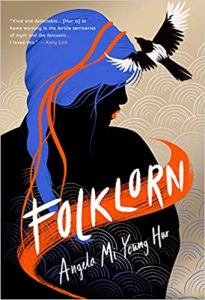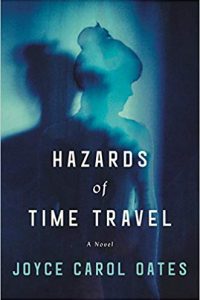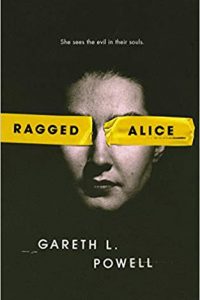Alex Brown Reviews Folklorn by Angela Mi Young Hur
 Folklorn, Angela Mi Young Hur (Erewhon 978-1645660163, $26.95, 416pp, hc) April 2021.
Folklorn, Angela Mi Young Hur (Erewhon 978-1645660163, $26.95, 416pp, hc) April 2021.
It’s rare that I finish a book and find myself at a loss as to how to review it, but here we are with Angela Mi Young Hur’s sophomore novel Folklorn. Ostensibly, it is a novel about the daughter of immigrants trying to solve the mystery of what happened to her sister, but it is so much more than that. So, so, so much more. Genre-defying and emotionally unsettling, it is a book that refuses to stay in whatever category the reader wants to put it.
Elsa, the American-born daughter of Korean immigrants who survived the war that brutalized their homeland, is alone, but too wrapped up in her work to acknowledge her loneliness. Driven by a need to escape her unbearable family life, she allows her older brother to bundle her off to a boarding high school, then ensconces herself in her work, first in Stockholm and then in Antarctica. Although she enjoys her work, she lets it consume her until there’s little room for anything or anyone else. No real friends, no cherished lovers, no found family, just Elsa, her ghost particles, and the gnawing sensation of unfinished business. After a surreal experience with some malfunctioning equipment and an Antarctic pool party, the “imaginary” friend she had as a child (who might be the restless spirit of her dead sister) returns.
Back in Stockholm, Elsa seeks out Oskar Gantelius, a Korean adoptee and academic with extensive knowledge of folklore, to help her untangle her mother’s obsession with stories of sacrificial girls. When her mother, who has been catatonic for years, dies suddenly, Elsa’s life begins to fracture, first in tiny, almost imperceptible ways, then in soul crumbling cracks. With the guidance of her possibly hallucinogenic, possibly ghostly friend, Elsa returns to Southern California to deal with her slowly deteriorating father and her emotionally unstable older brother. The more of her mother’s secrets she uncovers, the more she begins to wonder if her sister really was stillborn after all. How much of her mother’s strange folktales were based in truth is a mystery Elsa is determined to solve, even if the answer shatters her world completely.
Elsa is a confounding character. She constantly makes harsh assumptions about others, but then judges them for making similarly harsh assumptions about her. Struggling with internalized racism stemming from the sheer volume of white supremacy she had to deal with growing up, she often wields it as a defense mechanism. She expects racism everywhere, and often fails to reckon with how other people of color might be filtering their interactions through their own contexts.
With her confrontational attitude and bitter memories, Elsa exists in a space beyond “likeable” and “unlikeable.” So do the rest of the characters, frankly. The Park parents are tormented by and torment each other with their grief, trauma, and spite. Chris is a selfish know-it-all who expects great rewards for doing the bare minimum. Even Oskar, Elsa’s love interest, is as riddled with internalized racism as the woman he cares for. He channels that resentment into his work in both positive and negative ways.
Just as the characters refuse to be placed in neat little boxes, so too does the narrative structure. Hur weaves in the past and present, plays with the unreliable narrator trick, and breaks up the story with grim, bloody folktales. As troubling as some of the characters’ confrontational scenes felt, they also felt true. Hur doesn’t fall back on shock value or edginess for edgy’s sake. She’s pulling from something real and dark, exposing its morally messy underbelly.
Hur also explores the generational trauma left by the Korean War. For the Parks, we see that trauma being passed down from parent to child, and then back up again. The parents experienced terrible things during the war and then carried that into their new lives in the New World. Bad luck and poor choices compounded that pain, and so they foisted that pain onto their children. As adults, their children push it right back, the cycle unending and unrelenting. I’m not the child of Korean immigrants, so I can’t comment on those particular experiences. However, as the descendant of enslaved Africans, I certainly understand the way generational trauma rears its ugly head in sometimes unexpected ways. That is a stain that is almost impossible to remove.
Folklorn is less fantasy and more magical realism with a splash of intensely nerdy science thrown in for good measure. Angela Mi Young Hur takes the plot down difficult paths but never loses sight of what is real, even if Elsa herself cannot tell what is true and what is false. It is not a beach read or even a quick read. It takes work to settle into it, but it’s well worth the effort.
This review and more like it in the August 2021 issue of Locus.
 While you are here, please take a moment to support Locus with a one-time or recurring donation. We rely on reader donations to keep the magazine and site going, and would like to keep the site paywall free, but WE NEED YOUR FINANCIAL SUPPORT to continue quality coverage of the science fiction and fantasy field.
While you are here, please take a moment to support Locus with a one-time or recurring donation. We rely on reader donations to keep the magazine and site going, and would like to keep the site paywall free, but WE NEED YOUR FINANCIAL SUPPORT to continue quality coverage of the science fiction and fantasy field.
©Locus Magazine. Copyrighted material may not be republished without permission of LSFF.






Enjoyed the review.